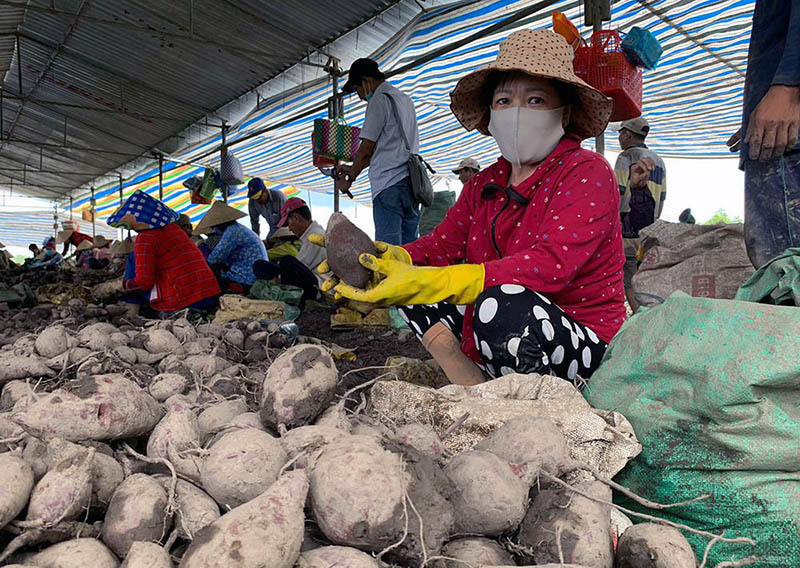- © Copyright of Vietnamnet Global.
- Tel: 024 3772 7988 Fax: (024) 37722734
- Email: evnn@vietnamnet.vn
e-commerce
Update news e-commerce
Agriculture Ministry to open new path for farm produce sales
“We have to figure out a new ‘farm produce path’ that allows us to connect fields and markets,” said Minister of Agriculture and Rural Development Le Minh Hoan.
E-commerce platform imports billions of US dollars of Chinese goods
The Vietnamese Ministry of Finance believes that it is necessary to have regulations to control exports and imports transacted through e-commerce platforms.
Online Vo So platform sells food in HCM City
After HCM City resumed operation of goods delivery services on August 31, Viettel Post and Vo So e-commerce platform opened an "online market" to provide food and essential goods for people at hcm.voso.vn.
Vietnam assists exports of handicrafts via Amazon
Domestic enterprises have the opportunity to bring handicraft products to the global market via the US e-commerce giant.
Cross-border e-commerce opens 'green lane' for local businesses
The coronavirus pandemic has hit almost every country in the world, including Vietnam, causing disruption in the global supply chain.
Firms get help to partner with Amazon to fuel export
Some special cooperation programmes are being carried out by the Ministry of Planning and Investment (MPI) with a view to helping Vietnamese enterprises boost exports via e-commerce giant Amazon.
Vietnam vows to place 5 million farming households on e-commerce sites
Deputy Minister of Information and Communications Pham Anh Tuan has urged creating detailed plans on putting farming households on e-commerce sites.
Businesses discover online channel route to surviving COVID
Many HCM City businesses, even small traders in traditional markets who are not usually thought to be tech-savvy, have been focusing on selling online and networking to survive, or even thriving, amidst the ongoing COVID-19 pandemic.
5 million farmer households to sell produce online this year
Postmart and Voso have trained farmers to organize livestreams, and advertise their products by shooting video or taking photo. They can create their own booths and sell products on these floors even during the time of social distancing.
ASEAN Online Sale Day 2021 attracts 300 businesses
ASEAN Online Sale Day 2021, the biggest online shopping event of all ASEAN consumers, is scheduled to begin at 00.00hrs on August 8 and last through to 24.00hrs on August 24.
Green zones clear the way for 1.1 million tons of farm produce
To maintain supply chains, Ministry of Agriculture and Rural Development (MARD) wants to set up ‘buffer zones’ to gather farm produce and build ‘green passages’ and ‘green zones’ for farm produce distribution.
Barriers removed to help e-commerce platforms ensure essential supplies
The Ministry of Industry and Trade's Department of E-commerce and the Digital Economy has been cooperating with e-commerce platforms to remove barriers to the transportation of essential goods during the COVID-19 outbreak.
Southern provinces assisted to sell farm produce amid social distancing
An online forum has been organized to discuss solutions to help 19 southern provinces sell their farm produce.
Ministry to help farming households sell goods on e-commerce
Postmart and Vo So e-commerce sites have been assigned to place farm produce on sale, thus promoting the digital economy in agriculture and rural development.
Local e-commerce needs support to take on bigger foreign players
Policies are needed to support local e-commerce platforms and counter the might of cashed-up international e-commerce giants entering the Vietnamese e-commerce market, says chairman of Nextech, Nguyen Hoa Binh, who owned chodientu.vn.
Timeline extended for e-commerce taxation
Vietnam's tax authorities will give five more months for e-commerce platforms to set up data connectivity and begin sharing online sellers' information from January 2022.
Vietnamese top list of most online shoppers in SEA
Vietnam has the highest number of people shopping on e-commerce platforms in the Southeast Asia region with some 49.3 million people, according to the E-commerce White Book 2021 released by the Vietnam E-Commerce and Digital Economy Agency.
Vietnam set to reach mobile wallet penetration of nearly 55 per cent by 2025
Vietnam is set to see rapid expansion in terms of mobile wallet usage with mobile wallet penetration to reach nearly 55 per cent by 2025.
E-commerce platforms to be connected with tax agencies from next year
E-commerce platforms must be electronically connected with tax management agencies from the beginning of next year, not from next month, as the tax watchdog aims to better collect taxes from sellers operating on the platforms.
Lychees and the agricultural revolution in Vietnam
Farmers in the northern province of Hai Duong have earned revenue of VND1,600 billion in the lychee season this year, the highest ever.



















